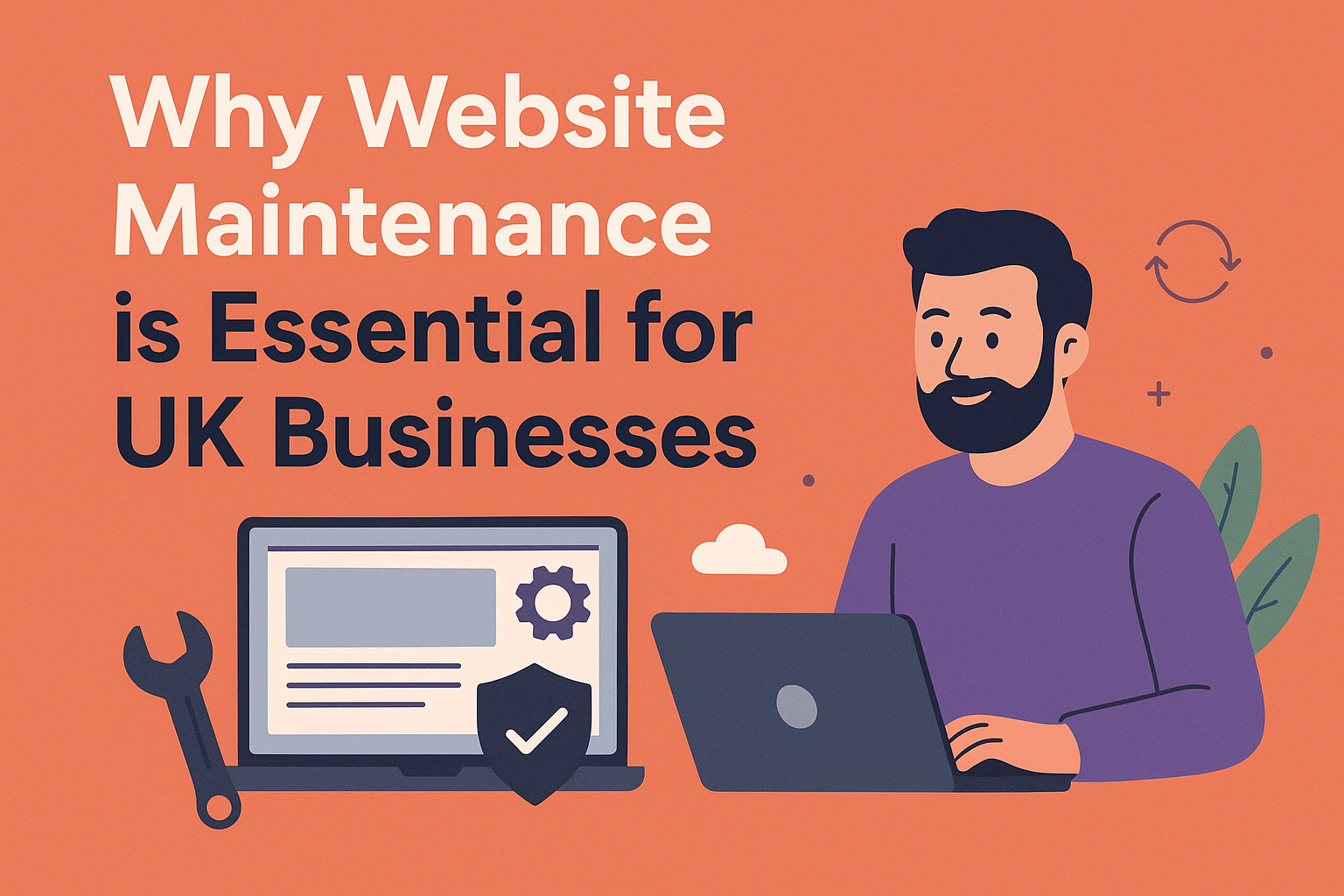Imagine walking into a shop where the shelves are dusty, the lightbulbs flicker, and the card machine doesn’t work. You’d probably walk out, right? Well, the same thing happens online when a business neglects website maintenance. A sluggish, outdated, or broken website turns customers away faster than you can say “checkout.”
In today’s digital-first world, your website isn’t just a business card—it’s your storefront, salesperson, and customer service desk rolled into one. That’s why website maintenance is essential for UK businesses of all shapes and sizes.
In this guide, we’ll explore why website upkeep is crucial, what happens when you ignore it, and how you can keep your site in tip-top shape without losing sleep (or customers).
Table of Contents
What Is Website Maintenance?
Website maintenance is the digital equivalent of servicing your car. It’s all about regularly checking, updating, and fixing your site to ensure it’s running smoothly, securely, and efficiently.
This includes:
Updating plugins, themes, and software
Backing up files and databases
Optimising speed and performance
Fixing broken links and 404 errors
Running security scans
Refreshing design and content
In short, it keeps your website alive and kicking—ready to serve your customers 24/7.
Why Website Maintenance Matters for UK Businesses {#why-website-maintenance-matters}
For UK businesses, a website isn’t optional anymore. Whether you run a small café in Manchester, a law firm in London, or an online boutique in Birmingham, your website is your lifeline to customers.
Here’s why maintenance matters:
Trust: Customers judge your professionalism based on how polished and reliable your website looks.
Search visibility: Google loves updated, fast, and secure websites. Without maintenance, your rankings can plummet.
Revenue: A broken checkout or sluggish page speed directly impacts sales.
Legal compliance: In the UK, GDPR and accessibility standards demand ongoing attention.
Simply put, website maintenance isn’t a luxury—it’s a necessity.
Common Risks of Neglecting Website Maintenance {#risks-of-neglect}
Failing to maintain your site is like leaving your front door wide open. Here are the top risks:
Security breaches: Outdated plugins are hackers’ favourite playgrounds.
Poor user experience: Broken links, slow loading, and clunky navigation frustrate visitors.
Revenue loss: Studies show slow websites lose conversions by up to 7% per second of delay.
SEO decline: Google penalises neglected sites, making it harder for customers to find you.
Brand damage: Nothing screams “unprofessional” louder than a half-broken website.
Key Benefits of Regular Website Maintenance {#benefits}
When you invest in regular website care, the rewards stack up:
Better security: Reduce the risk of hacks and data leaks.
Higher rankings: Search engines reward fresh, healthy sites.
Faster speed: Optimised pages keep visitors engaged.
Improved trust: A smooth experience builds customer confidence.
Peace of mind: Sleep better knowing your site is safe and sound.
It’s not just about fixing problems—it’s about unlocking your website’s full potential.
Essential Website Maintenance Tasks {#maintenance-tasks}
Here’s a checklist of must-do tasks:
Weekly backups
Monthly plugin and theme updates
Security monitoring
SSL certificate checks
Content refresh and SEO updates
Speed optimisation
Mobile responsiveness testing
By ticking these off regularly, you’ll avoid nasty surprises down the line.
How Often Should You Maintain Your Website? {#how-often}
Think of it like cleaning your home: some chores need doing daily, others weekly or monthly.
Daily/Weekly: Backups, security scans, uptime monitoring.
Monthly: Updates, broken link checks, performance tests.
Quarterly: SEO review, content refresh, accessibility check.
Annually: Design review, compliance audit, domain renewal.
Skipping these steps is like ignoring a leaky tap—it only gets worse with time.
DIY vs Professional Website Maintenance {#diy-vs-professional}
Sure, you can do website maintenance yourself. But should you?
DIY Pros:
Lower upfront costs
Full control over changes
DIY Cons:
Time-consuming
Risk of mistakes
Missed security updates
Professional Pros:
Expert handling
Proactive problem-solving
Saves time and stress
That’s why many UK businesses turn to professionals like WebJourny for ongoing support.
Website Maintenance Packages in the UK {#packages}
One size doesn’t fit all. That’s why many agencies (including us) offer flexible Packages.
Options usually include:
Basic: Updates and backups
Standard: Security, speed, and SEO checks
Premium: Full support with 24/7 monitoring
The right package depends on your website size, traffic, and business goals.
How WebJourny Can Help {#webjourny-help}
At WebJourny, we specialise in keeping UK business websites safe, speedy, and search-friendly. From services like SEO and hosting to hands-on maintenance plans, we’ve got your back.
👉 Explore more on our blog for tips.
👉 Ready to secure your site? Get in touch today.
FAQs {#faqs}
Q1. How much does website maintenance cost in the UK?
A: Costs vary depending on your needs. Basic plans can start from as little as £30/month, while advanced packages may cost £200+ per month.
Q2. Can I maintain my website myself?
A: Yes, but unless you’re tech-savvy, it’s risky. Professional support ensures updates, security, and backups are done right.
Q3. How often should I update my website?
A: At least monthly for plugins and themes, with weekly backups and daily security scans recommended.
Q4. What happens if I ignore website maintenance?
A: Expect slower performance, security vulnerabilities, SEO drops, and potential revenue loss.
Q5. Why choose WebJourny for maintenance?
A: We provide tailored, reliable support for UK businesses—keeping your site running so you can focus on running your business.

